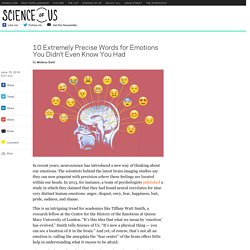

The 8 Coolest TED Talks on Psychology. How to Increase Your Emotional Intelligence ― 6 Essentials. Future - The ‘untranslatable’ emotions you never knew you had. This story is featured in BBC Future’s “Best of 2017” collection.

Discover more of our picks. Have you ever felt a little mbuki-mvuki – the irresistible urge to “shuck off your clothes as you dance”? Perhaps a little kilig – the jittery fluttering feeling as you talk to someone you fancy? How about uitwaaien – which encapsulates the revitalising effects of taking a walk in the wind? These words – taken from Bantu, Tagalog, and Dutch – have no direct English equivalent, but they represent very precise emotional experiences that are neglected in our language. Lomas’s Positive Lexicography Project aims to capture the many flavours of good feelings (some of which are distinctly bittersweet) found across the world, in the hope that we might start to incorporate them all into our daily lives. Learning these words, he hopes, will offer us all a richer and more nuanced understanding of ourselves. Welcome to The Human Planet. Myers Briggs Personality Types - The Minds Journal. The phrase Myers Briggs is most often used to describe a personality theory developed by Isabel Briggs Myers and her mother Katherine Briggs.

It explains some of the main differences between people and is often used to help choose a career, improve relationships, develop leadership skills, etc. When the phrase Myers Briggs is used in the name of a personality questionnaire, it refers specifically to the commercial Myers-Briggs Type Indicator® instrument, published by Consulting Psychologists Press.
However, there are many alternative questionnaires that produce a similar result. Overview There is a lot to Myers Briggs theory, though at its heart are four simple preferences. In Myers Briggs theory, for each pair you prefer one style over the other. Extraversion and Introversion – The first pair of styles is concerned with the direction of your energy. Sensing and Intuition – The second pair concerns the type of information/things that you process. 10 Words for Emotions You Didn’t Even Know You Had. In recent years, neuroscience has introduced a new way of thinking about our emotions.

The scientists behind the latest brain-imaging studies say they can now pinpoint with precision where these feelings are located within our heads. In 2013, for instance, a team of psychologists published a study in which they claimed that they had found neural correlates for nine very distinct human emotions: anger, disgust, envy, fear, happiness, lust, pride, sadness, and shame. This is an intriguing trend for academics like Tiffany Watt Smith, a research fellow at the Centre for the History of the Emotions at Queen Mary University of London.
“It’s this idea that what we mean by ‘emotion’ has evolved,” Smith tells Science of Us. “It’s now a physical thing — you can see a location of it in the brain.” It’s exactly that — the subjective experience of emotions — that Smith explores in her charming new book, The Book of Human Emotions. Awumbuk: It’s a funny thing about house guests. Free personality test, type descriptions, relationship and career advice. Los 10 experimentos psicológicos más controvertidos. La psicología es una ciencia relativamente nueva que ganó popularidad en el siglo 20 con Wilhelm Wundt.

Muchos de los primeros psiquiatras fueron demasiado lejos con sus experimentos en su afán de aprender sobre los procesos del pensamiento y el comportamiento humano. Estos experimentos tan poco éticos sirvieron para sentar las bases de los códigos éticos actuales. 10) El Estudio Monster (1939). El estudio Monster fue un experimento sobre la tartamudez en 22 niños huérfanos de Davenport, Iowa, en 1939. Fue llevado a cabo por Wendell Johnson de la Universidad de Iowa. 9) El Proyecto Aversión (1970 y 1980). Este experimento se llevó a cabo en el seno del ejército del Apartheih en el cual se detectaba la presencia de soldados gays y lesbianas, y se les sometía a castraciones químicas, terapias con electroshock e incluso a operaciones de cambio de sexo.
Todo esto formaba parte de un programa de alto secreto para acabar con la homosexualidad en el ejército del Apartheid. When you feel happy, really happy, it somehow... - QuoteSwagga. As often as I think about this, i'm just now learning there is a word for it. - GIF on Imgur.